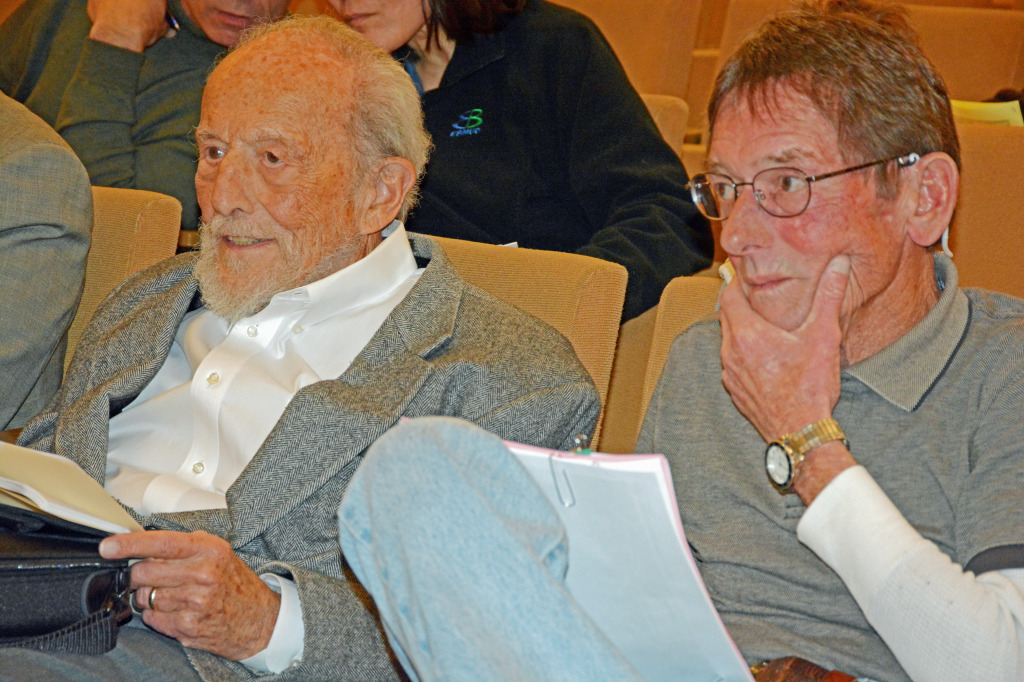Local Small Businesses Object to Coliseum City Development
Jan 23, 2015
Posted in Coliseum City, Community, Economic Development, Environment, Gentrification, Housing/Foreclosures, Labor
By Ken Epstein
Representatives of small businesses are complaining that city staff is on a fast track to adopt a formal plan for a massive Coliseum City development project, which has reached the final stages of approval without consulting affected companies.
The rezoning of the area for a stadium, housing and retail development on the Oakland airport side of Interstate 880 will eliminate much of Oakland’s only business park and many of its small businesses, which employ local residents, according the businessmen.
“I object to the plan, which will effectively over time destroy the business park without discussion or community input as originally promised and budgeted for when the planning process was instituted. Good paying business jobs will be sacrificed for sports, entertainment and residences without consulting the present community,” according to Robert Schwartz, long time Oakland resident and owner of Key Source international on Oakport Street in the business park.

Schwartz and others spoke Wednesday at a poorly announced Oakland Planning Commission public hearing on the plan.
City staff and a consulting team have been working on the plan for the past two years. Schwartz and others are saying they have been allowed to comment on the plan after it was designed but not to be part of the design process itself.

The Coliseum City plan, according to the City of Oakland’s website, “seeks to transform the underutilized land around the Oakland-Alameda County Coliseum and Arena into a world-class sports, entertainment and science & technology district that boasts a dynamic and active urban setting with retail, entertainment, arts, culture, live and work uses.”
The 800-plus acre site includes the present coliseum arena and the area on the west side of the freeway w, where the Oakland Airport Business Park is located and extends all the way to the waterfront.
Objecting to the characterization of the business park as “underutilized land,” Schwartz said that industrial- and light-industrial use land sells for less than retail-use and residential-use land. Therefore, if zoning for industrial use is removed, the market value of the land will go up.
Existing businesses will sell out and move out of Oakland. New companies will not be able to afford to set up shop in the city.
Schwartz says he does not see the utility to the city of eliminating good jobs at long standing local businesses in favor of creating poorly paying jobs at stadiums for “popcorn vendors.”
In a letter to the city’s department of Planning and Building, James Curtis, president of the Oakland Commerce Corporation, agreed with Schwartz.
“We object to your plan to cross the 880 freeway and intrude into our existing Port of Oakland Business Park,” he said. “That appears to use an unnecessary and detrimental encroachment on the existing businesses in the park.
“Part of the (Coliseum) Plan should include funding to improve the infrastructure and help revitalized its’ appeal for future expansion and job creation,” said Curtis.
Speaking on behalf of the OaklandWorks Alliance at the Wednesday hearing, Fred Ellis read a statement backing the small business’ concerns.
“We oppose any rezoning without the opportunity for full community discussion by the affected communities,” said Ellis. “We oppose zoning changes that appear to remove East Oakland’s only business park and displace at least one of Oakland’s long standing and important businesses.”
“Few East Oakland residents are even aware that such immense and important policy changes are occurring,” Ellis continued. “The staff has provided no justification for proceeding without a participatory advisory committee of Oakland residents.”
“The planning process for East Oakland needs a restart,” he said.
Among the organizations in OaklandWorks are the West Oakland Environmental Indicators project, Black Women Organized for Political Action (BWOPA), People United for a Better Life in Oakland (PUEBLO), Oakland Black Caucus, Concerned Black Men and the John George Democratic Club.
Some people are saying that the rush to approve the project came from former Mayor Jean Quan’s administration, and there could potentially be a different approach under Mayor Libby Schaaf.
Speaking informally after the public hearing, one staff member said: “This project didn’t start with a clean slate. We heard: ‘Here are your marching orders.’”
Schwartz has said he does not oppose moving ahead with the building of new sports arenas on the Coliseum property but is against the city’s plan to eliminate the business park on the West side of the freeway.
Before it is approved, the development plan has to overcome other hurdles, including the concerns of the Port of Oakland and the EBMUD, which are both impacted by the proposal. The plan must also gain the backing of the developers, who are working to put together private funding for the project.
The Planning Commission has scheduled hearings on the development plan on Feb. 4 and Feb. 9 and a vote on Feb. 18. If passed, the proposal will go to the City Council, where it could be approved in March.